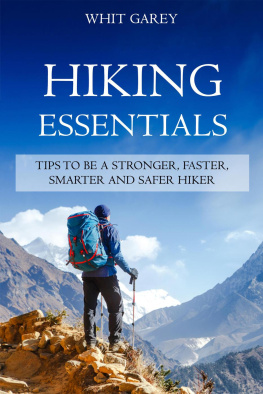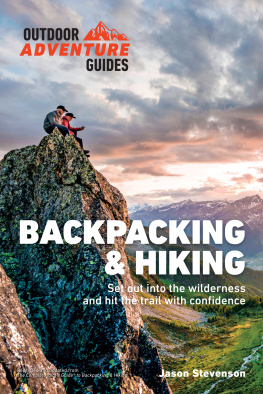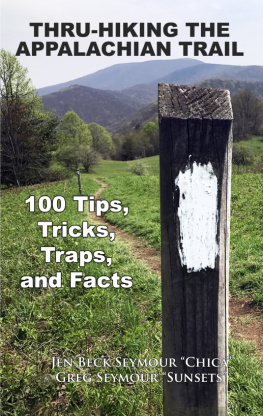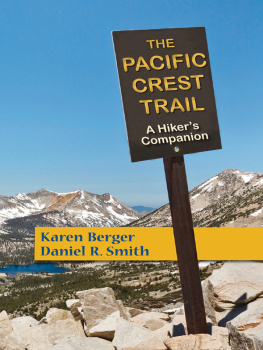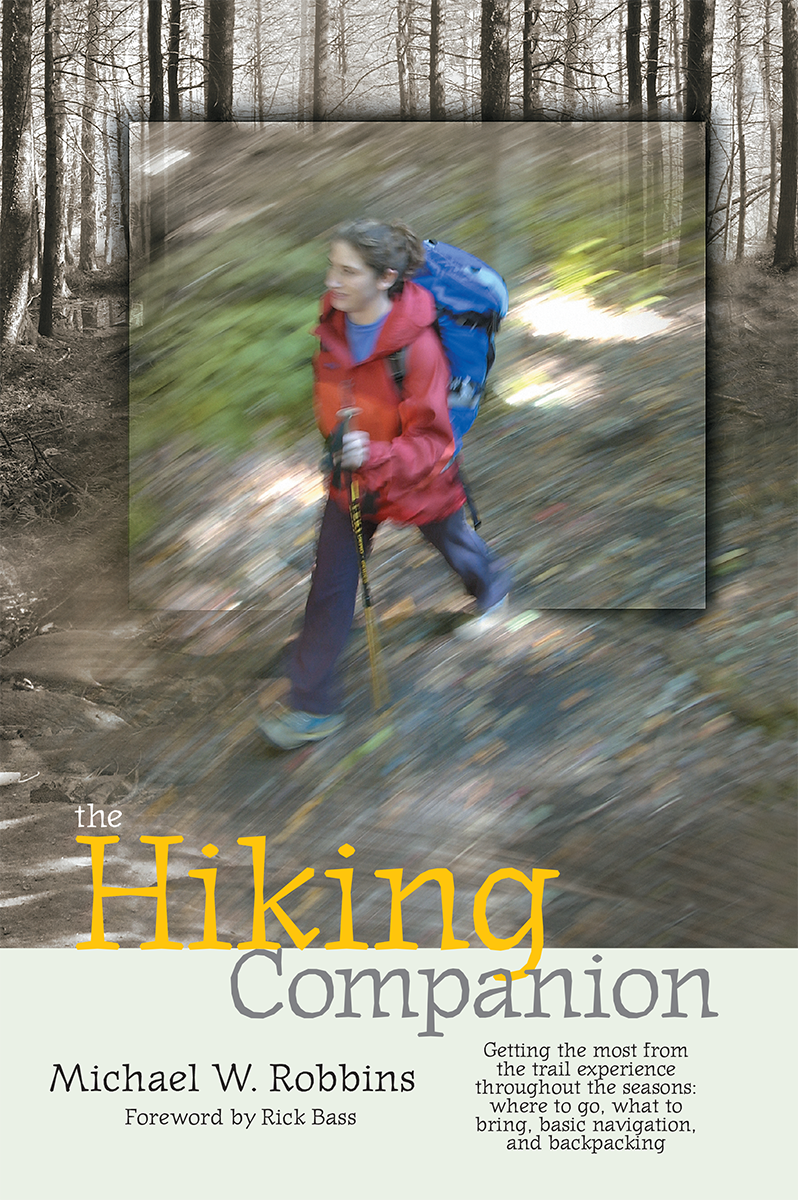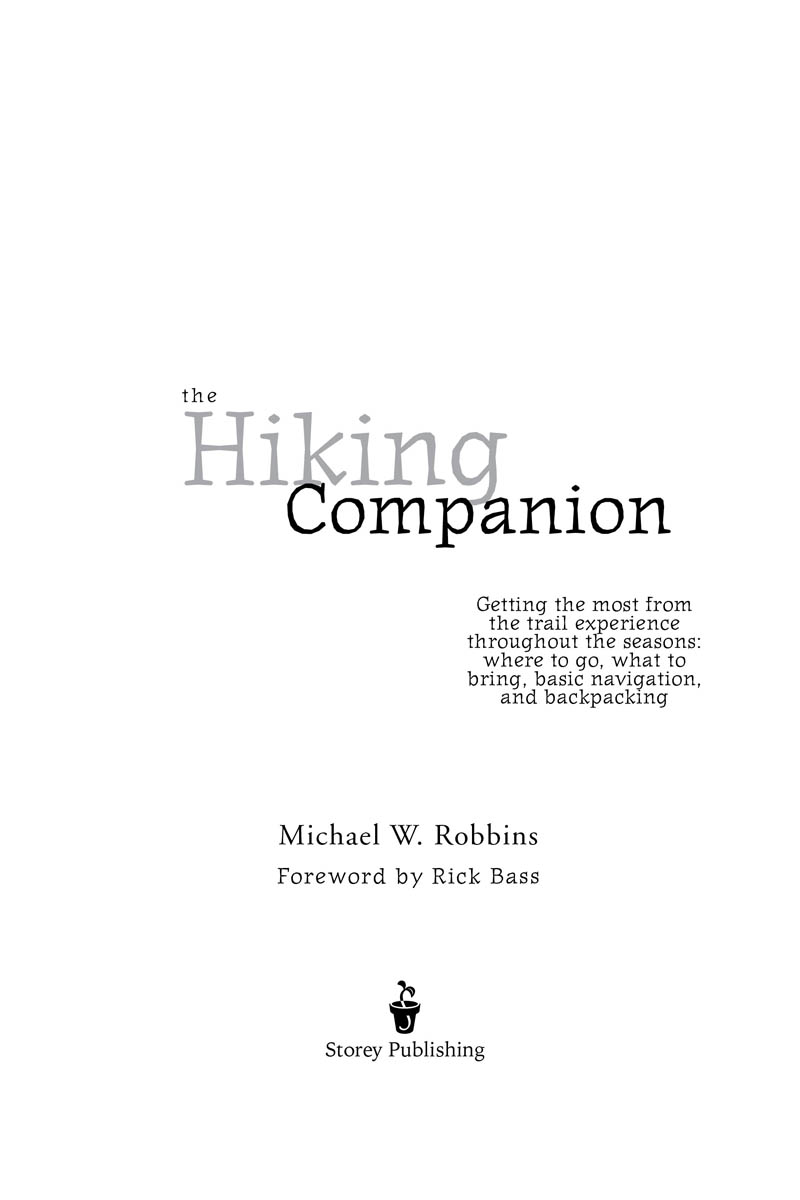Contents
Foreword
This is a book full of good ideas, not the least of which is the reminder that the ancient, simple act of taking a hike is a wonderful way to readjust ones gaze in the world away from ones navel, and instead to look outward, beyond the microscopic universe of the self. Paradoxically, of course, a good hike or ski tour or backpacking trip is one of the most indulgent things you can do for yourself, yielding results to your physical and emotional health that simply cannot be gotten in any other way.
I like what Robbins has to say about walking or hiking where you live, and utilizing your public land, which is still at last reporting owned by you. The pressures to divest the public of this vast and invaluable and irreplaceable resource wax and wane with various administrations and Congresses, as does the tolerance for physical assaults on that land heritage by the various extractive interests that contribute so heavily to legislators campaign coffers...
One of the great things about hiking, though, is that whenever your blood starts sludging up with such thoughts, the land itself, and the supple act of moving across its many contours, warms the blood, thins the blood, and reminds the hiker of the virtues of patience and gentility and the deeper, more elemental essential truths of awe and wonder.
This book is full of useful tips, one of the most valuable of which, in my humble opinion, is always to carry duct tape. Where I live, any device or vehicle or even article of clothing that does not possess at least one scrap of that exquisite and miraculous space-silver material is deeply suspect, clearly so new-and-just-out-of-the-box as to be completely untested, which is far riskier than to be broken-but-repaired.
In this vein, Robbinss advice about carrying (or stashing) a second set of car keys is also tremendous advice never mind why or how I know this. I like what he has to say about maps, too; even when youre lost, they can be a comfort. I like even better what he has to say about getting lost or, more commonly, not knowing where you are. Dont panic, which always compounds initial mistakes. Instead, cut your losses, sit down, regather your energy, and think things through. If you hike with any degree of frequency, itll happen again and again. If heeded, however, Robbinss advice will save you a lot of time on the learning curve, and perhaps more than that.
A last piece of technical advice concerning Robbinss encounter in Glacier National Park: Dont go hiking with pistol-packing cowboys. A can of red pepper spray is more effective as well as forgiving. And, of course, dont cook smelly foods in bear country and dont leave behind any scraps that a wandering-through bear could find and nibble, before making the calculation that people = food. In the West (or, increasingly, anywhere), a fed bear is a dead bear; no good can come of any relationship in which a bear associates people with food.
Notepaper and pen, matches, moleskin, hat, small flashlight, decent gloves all good ideas for hiking, of course. But beyond the practical, be aware, too, of the seemingly magical glide, or reverie, about which Robbins writes so eloquently, in which, after some initial roughness and weariness is ironed out, the proverbial second wind arrives, mentally as well as physically. Robbins describes this process the flow of the imagination as it engages with a physical landscape, and the therapeutic patter of silent conversations and thoughts that occur within ones self while hiking, figuring out relationships, figuring out who said what and why, figuring out almost everything as well as I have ever seen it addressed.
In taking care of yourself in treating yourself to a hike no matter what the condition of the days weather, nor your physical state afterward, you invariably emerge better able to take care of yourself, your place in the world, and those around you. This, in particular, is one of the greatest treasures and legacies of our public lands not the scant and puny last few board feet of timber that can be liquidated, nor the ore dug and clawed out from beneath the publics strongbox but, far more valuable, the thing, the land itself, intact and giving us solace in troubled times. Its free, this hiking about on public land, and its healthy and legal. Its what we were made for.
Rick Bass
one
The Rewards of Hiking
Ever wonder whats over the next hill? Or beyond the horizon?
Why go hiking?
At the level of just taking a walk, motives are few and obvious: Get out of the house. Get some fresh air. Exercise. Take in a change of scenery. Most of these itches would be scratched by a walk around the block. But for many Americans, taking a walk around the block isnt as simple as it once was and ought to be. Many suburban neighborhoods are so committed to the primacy of the automobile that they are an obstacle course to strolling humans. Sidewalks are scarce, roads are narrow with blind curves, and traffic moves quickly. In such places, taking a walk is not a soothing experience but an anxious one. Walking feels dangerous. And even if the proximity to fast-moving traffic is not directly hazardous, the onslaught of noise and exhaust fumes offends the ears and pains the lungs.
In some suburban locales where the houses are attractive, the landscaping is appealing and varied, and the roads are safe but walking is not a common activity, walkers may be regarded with not-so-subtle suspicion. (Not to mention the hostile dogs barking ferociously as you pass or, even worse, venturing out for a closer examination of your ankles.) If for whatever reason you dont look like most local residents, homeowners may wonder who you are and what youre up to in their neighborhood. While out walking in a neighborhood I once lived in Ive been stopped by policemen in radio cars for no reason other than the fact that I was walking along a residential road, and to the police officers that constituted odd and suspicious behavior.
There are much more rewarding places to be than on suburban sidewalks. Venture farther afield. Take a hike.
When you change your thinking from walk to hike, you open yourself to a new range of experiences that this book will elaborate upon.
Hiking, to me, means getting into natural surroundings. Were talking here not of simple greenery (golf courses are green, botanic gardens are green, Astroturf is green) but of actual nature, that is, a locale where the hand of man has not relentlessly shaped every space, every surface, and every vista. Hiking also means making a commitment to a certain significant distance. You dont need to measure your mileage and consider your hike a success only if youre setting some kind of time/distance record, but you should be moving along at least for a couple of miles or a couple of hours. To me, a hike happens when you can see some different vistas and work up a sweat. The point is to give yourself a chance for an experience with nature.
Of course, a truth so obvious that it almost goes without saying is that hiking is good exercise. When I have not hiked or bicycled or otherwise exercised for a while (I cant claim to hike and write at the same time), I always notice that in the first 30 minutes or so on a trail I feel every muscle working, feel my breathing start changing. If its a steep trail, I always wonder whether Im really up to it this time. Then I walk right through that feeling, and within an hour or so Im moving easily, whatever the type of terrain, fully warmed up. When that happens, I feel that I could hike all day.


